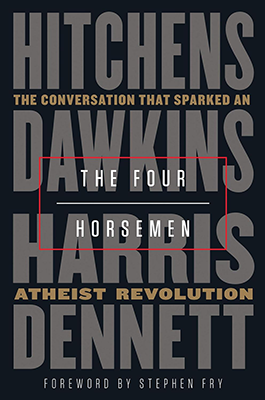The Four Horsemen
“The Four Horsemen: The Conversation That Sparked an Atheist Revolution” is a panel discussion featuring four prominent atheist authors: Richard Dawkins, Daniel Dennett, Sam Harris, and Christopher Hitchens. The term “Four Horsemen” is a reference to the biblical imagery of four horsemen bringing about the apocalypse in the Book of Revelation.
At the dawn of the new atheist movement, the thinkers who became known as “the four horsemen,” the heralds of religion’s unraveling—Christopher Hitchens, Richard Dawkins, Sam Harris, and Daniel Dennett—sat down together over cocktails. What followed was a rigorous, pathbreaking, and enthralling exchange, which has been viewed millions of times since it was first posted on YouTube. This is intellectual inquiry at its best: exhilarating, funny, and unpredictable, sincere and probing, reminding us just how varied and colorful the threads of modern atheism are.
Here is the transcript of that conversation, in print for the first time, augmented by material from Dawkins, Harris, and Dennett. These new essays, introduced by Stephen Fry, mark the evolution of their thinking and highlight particularly resonant aspects of this epic exchange. Each man contends with the most fundamental questions of human existence while challenging the others to articulate their own stance on God and religion, cultural criticism, spirituality, debate with people of faith, and the components of a truly ethical life.
During the discussion, which took place in 2007 at the Ethical Society in New York City, the four intellectuals engaged in a wide-ranging conversation about atheism, religion, morality, and the role of science in society. The event and subsequent conversations helped to popularize the so-called “New Atheism” movement, which advocates for a more vocal and assertive critique of religion and religious belief.
The Four Horsemen collectively expressed skepticism toward religious claims, criticized the harmful effects of religious dogma and fundamentalism, and advocated for secularism, scientific rationality, and humanistic values. While their viewpoints varied on certain issues, they shared a common commitment to promoting reason, evidence-based inquiry, and secular ethics in public discourse.

